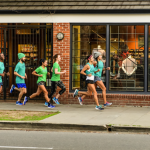Holiday retail sales during 2019 grew 4.1 percent over the same period in 2018 to $730.2 billion, said the National Retail Federation on Thursday.
The numbers exclude automobile dealers, gasoline stations and restaurants. Online and other non-store sales were up 14.6 percent over the year before at $167.8 billion and are included in the total.
“Having spent the last week with top retail leaders from around the world at our annual convention, and spending time at the White House yesterday with government policymakers and economists, these numbers validate continued optimism for increased investment and opportunity in the retail industry,” NRF President and CEO Matthew Shay said. “This is a consumer-driven economy and by any measure, the consumer has put the economy in a solid position for continued growth. This is a strong finish to the holiday season, and we think it’s a positive indicator of what’s ahead.”
NRF forecasted in October that 2019 holiday sales during November and December would increase between 3.8 percent and 4.2 percent for a total of between $727.9 billion and $730.7 billion. The forecast called for online sales to increase between 11 percent and 14 percent to between $162.6 billion and $166.9 billion.
The growth rate reported today is nearly double the weak 2.1 percent seen during the 2018 holiday season, which was slowed by a government shutdown, stock market volatility and interest rate hikes. Sales during December 2018 were down 0.2 percent from the year before.
“This was a healthy holiday season, especially compared with the decline in retail sales we saw at the end of the season in 2018,” NRF Chief Economist Jack Kleinhenz said. “Despite a late Thanksgiving and worries about tariffs, the consumer didn’t go away. We’ve had months of strong employment numbers, high wages and strong household balance sheets. There’s no doubt that it gave consumers a sense of confidence about their ability to spend, and they did their part to keep the economy moving.”
Retail sales in December 2019 alone increased 0.5 percent seasonally, adjusted over November, and were up 6.7 percent unadjusted year-over-year.
December’s results follow November’s decline of 0.1 percent month-over-month and an increase of 1.3 percent year-over-year. As of December, the three-month moving average was up 4.1 percent over the same period a year ago, compared with 3.1 percent in November.
Kleinhenz said the modest growth in November and the large increase in December came partly because two key days of the Thanksgiving shopping weekend —Sunday and also Cyber Monday—fell in December this year.
NRF’s numbers are based on data from the U.S. Census Bureau which said today that overall December sales— including auto dealers, gas stations and restaurants—were up 0.3 percent seasonally adjusted from November and up 5.8 percent unadjusted year-over-year.
Specifics from key retail sectors during the November-December holiday season include:
- Online and other non-store sales were up 14.6 percent year-over-year;
- Grocery and beverage stores were up 2.9 percent year-over-year;
- Furniture and home furnishings stores were up 2.6 percent year-over-year;
- Health and personal care stores were up 1.6 percent year-over-year;
- Building materials and garden supply stores were up 1 percent year-over-year;
- General merchandise stores were up 0.4 percent year-over-year;
- Sporting goods stores were down 0.4 percent year-over-year;
- Clothing and clothing accessory stores were down 1.6 percent year-over-year; and
- Electronics and appliance stores were down 2 percent year-over-year.
Photo courtesy NRF
















